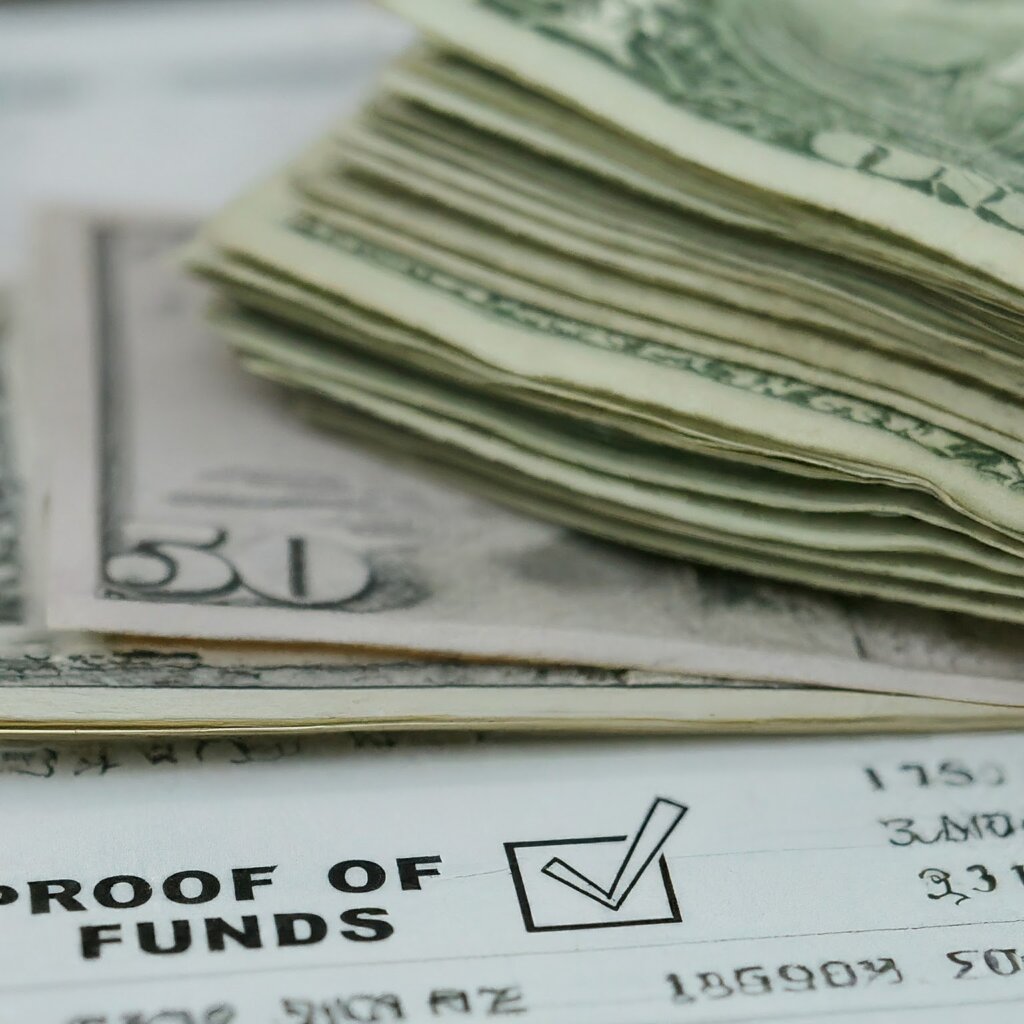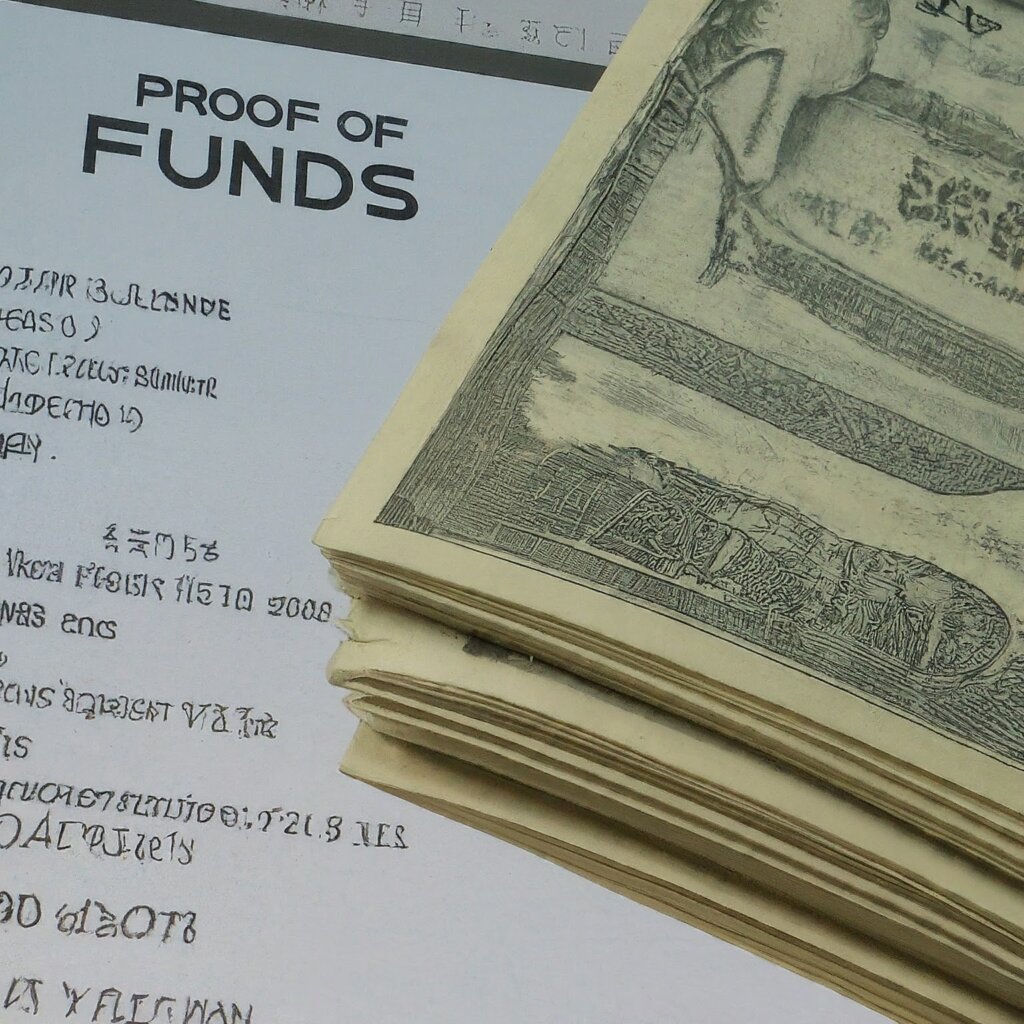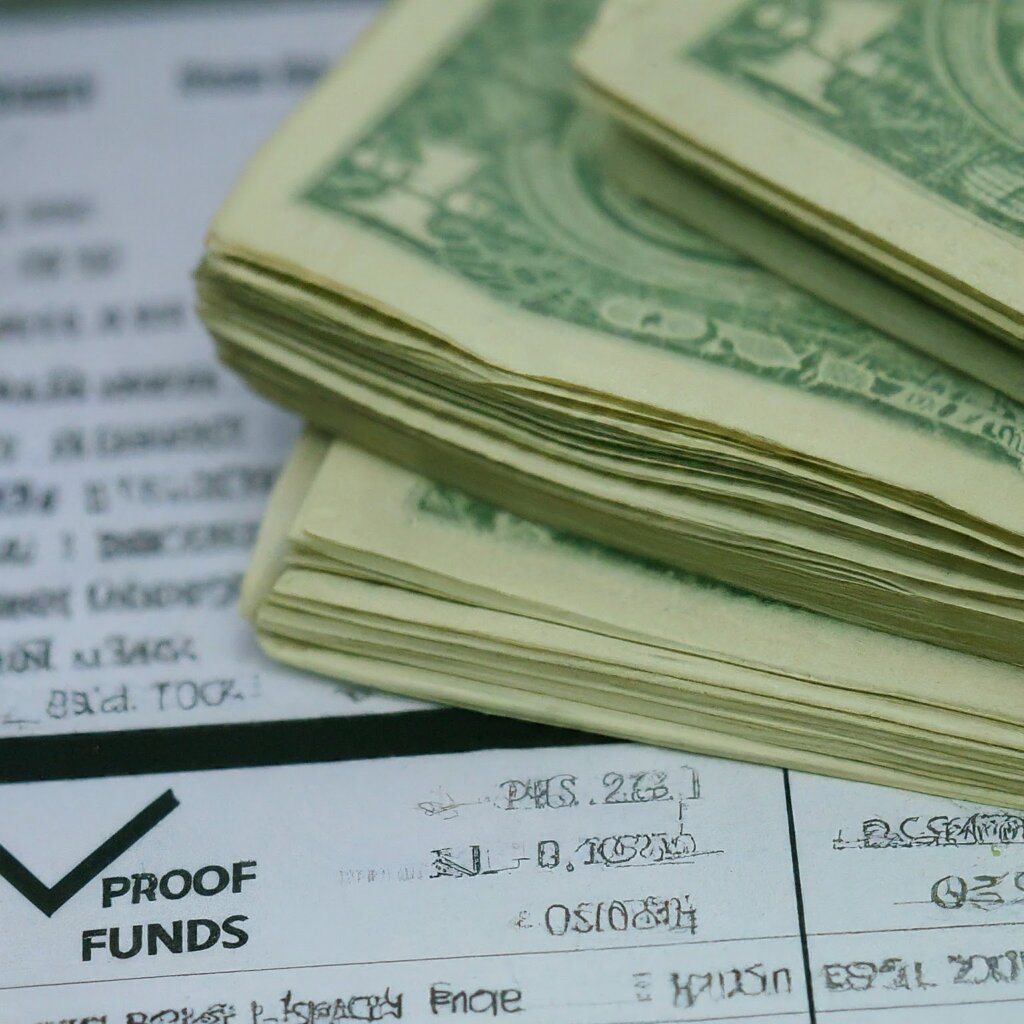Buying a house with cash offers undeniable speed and convenience, but before securing your dream home, proving you have the necessary funds is crucial. This article explores various methods of demonstrating your financial readiness and navigating the proof-of-funds process smoothly:
Understanding Why Proof of Funds Matters:
For both you and the seller, proof of funds ensures a smooth and secure transaction. It shows the seller you’re a serious buyer ready to close without financing delays, potentially making your offer more attractive.
Methods of Proof:
Several options exist, each with its strengths and considerations:
- Bank Statement: A recent bank statement displaying the full purchase price readily available in your checking or savings account is a common option. Ensure it covers the closing date and reflects sufficient funds.
- Proof of Funds Letter: Request a letter from your bank explicitly stating the available funds in your account, specifically earmarked for the house purchase. This formal document adds an extra layer of credibility.
- Investment Account Statement: While not as common, statements from brokerage accounts holding readily accessible funds like stocks or bonds might be acceptable in some cases. Discuss this option with your lender or real estate agent.
- Wire Transfer Confirmation: If funds are being transferred from another account, a confirmation of the completed transfer acts as proof.
Choosing the Right Method:
- Consult your lender or real estate agent: They can guide you on the preferred method based on your specific situation and local requirements.
- Clarity and Accuracy: Ensure the chosen method displays the available funds, account information, and your name.
- Timeliness: Update statements or request letters close to your offer submission for accurate representation of your finances.
Additional Tips:
- Multiple Accounts: If funds are spread across multiple accounts, combine them or provide statements for each, demonstrating the total available amount.
- Gift Funds: If using gifted funds, provide a gift letter from the donor outlining the amount and confirming it’s a non-repayable gift.
- Transparency and Communication: Maintain open communication with the seller and agent throughout the process, addressing any questions promptly. By taking reasonable precautions to confirm authenticity, cash buyers should have no issues providing legitimate proof of funds documentation. Transparent communication is also key throughout the offer and due diligence process. This transparency ensures that all parties are on the same page, minimizing misunderstandings and fostering trust. It allows for smooth verification of financial documents and helps prevent any potential roadblocks from arising, ensuring a seamless transaction from start to finish.
Beyond Proof of Funds:
While proof of funds is crucial, remember:
- Pre-approval Letter: Even with cash purchases, having a pre-approval letter showcases your financial strength and demonstrates you’ve explored financing options.
- Earnest Money Deposit: Be prepared to provide an earnest money deposit upon offer acceptance, demonstrating your commitment to the purchase.
Remember:
Showing proof of funds is a key step in securing your dream home with a cash purchase. Carefully choose the appropriate method, ensure accuracy and clarity, and communicate transparently throughout the process. By following these steps and consulting with qualified professionals, you can navigate this vital aspect of your cash home purchase successfully.

Proving Your Purchasing Power: Showing Cash Funds for Home Buying
All-cash offers provide home sellers concrete certainty a buyer can close quickly without financing barriers, especially alluring bargaining during uncertain markets. But how should real estate investors sufficiently demonstrate robust funding availability when bidding all cash on fixer-upper properties?
Recent bank statements proving healthy account minimums help initially, but smart sellers require current screenshots verifying that transferred assets match down payments promised. Redacting account numbers preserves privacy.
Securing lender pre-qualification letters also builds buyer credibility even without actual mortgages involved. It signals outside validation of an investor’s net worth and business performance likely mirroring balance sheets.
For larger corporate cash buyers, preliminary paperwork from private capital partners indicating pledged transaction backing offers another stamp of legitimacy during negotiations. Documents should feature partner company letterhead and legally binding language around deal funding obligations.
Ultimately, direct wire transfer receipts confirming earnest money deposits were pushed into valid escrow accounts reassure sellers an all-cash buyer’s intentions will complete as contracted. This readies final payments for smooth closings.
Savvy home sellers expect more than verbal claims from investors bidding all cash – bank statements proving liquidity and transaction histories verifying prompt funding carry tangible weight driving deals forward with confidence. Buyers should readily furnish paperwork backing up cash capabilities.
Proof of Funds FAQ
| Question | Answer |
|---|---|
| Why is showing proof of funds important when buying a house with cash? | Demonstrating proof of funds reassures sellers that you have the financial capability to purchase the property outright without relying on mortgage financing. It enhances your credibility as a serious buyer and expedites the closing process. |
| What is the most common way to show proof of funds? | The most common method is providing a recent bank statement that clearly displays your account balance covering the purchase amount plus any additional funds for closing costs. |
| Can I use other forms of documentation besides a bank statement? | Yes, you can also provide a verification letter from your bank, a certified or official bank check, a proof of deposit certificate, or documentation for other liquid assets such as stocks, bonds, or retirement accounts. |
| Should I consult with a real estate attorney regarding proof of funds? | Consulting with a real estate attorney can be beneficial, especially in complex transactions or when alternative proof of funds is required. They can provide guidance on the most appropriate documentation based on your specific circumstances. |
| What should I do if the seller has specific preferences for proof of funds documentation? | It’s important to respect the seller’s preferences and provide the requested documentation in a timely and professional manner. Open communication with the seller or their agent is key to addressing any questions or concerns promptly. |
| How can I ensure that my proof of funds documentation is valid and credible? | Ensure that the documentation is clear, accurate, and verifiable. Provide original or official documents whenever possible, and be prepared to answer any questions or provide additional information as needed to reassure the seller. |

How to Show Proof of Funds to Buy a House with Cash
Buying a house with cash offers numerous advantages, including a quicker closing process, simplified negotiations, and increased attractiveness to sellers. However, one crucial step in the home-buying process is demonstrating to sellers that you have the funds available to purchase the property outright. Here’s a guide on how to effectively show proof of funds when buying a house with cash:
1. Obtain a Bank Statement: The most common way to prove your ability to purchase a home with cash is by providing a recent bank statement. This statement should clearly show your account balance, ideally covering the entire purchase amount plus any additional funds for closing costs.
2. Request a Verification Letter from Your Bank: Some sellers may request a verification letter from your bank confirming the availability of funds. This letter should be written on official bank letterhead and include details such as your account number, current balance, and the bank representative’s contact information for verification purposes.
3. Provide a Certified Check or Official Bank Check: If you’re planning to use funds from a specific account to purchase the property, you can obtain a certified check or official bank check payable to the seller or their representative. This physical document serves as tangible proof of your ability to cover the purchase price.
4. Obtain a Proof of Deposit Certificate: If you’ve recently deposited a large sum of money into your account, you can request a proof of deposit certificate from your bank. This document confirms the deposit amount and verifies that the funds are available for use in the home purchase transaction.
5. Provide Documentation for Other Liquid Assets: If you’re not using funds directly from a bank account, you can demonstrate your ability to purchase the property with other liquid assets such as stocks, bonds, or retirement accounts. In such cases, you’ll need to provide statements or official documentation from the relevant financial institution.
6. Work with a Real Estate Attorney: In complex transactions or situations where alternative proof of funds is required, consider consulting with a real estate attorney. They can guide the most appropriate documentation based on your unique circumstances and help ensure compliance with legal requirements.
7. Maintain Open Communication with the Seller: Throughout the home buying process, maintain open communication with the seller or their agent regarding the proof of funds requirements. Address any questions or concerns promptly and provide additional documentation as needed to reassure the seller of your financial capacity.
8. Respect Seller Preferences: Be mindful that sellers may have specific preferences or requirements regarding the format or timing of proof of funds documentation. Respect their requests and strive to provide the necessary documentation in a timely and professional manner to facilitate a smooth transaction.
By following these steps and providing clear and verifiable proof of funds, you can instill confidence in sellers and demonstrate your readiness to purchase a house with cash. This proactive approach not only expedites the home-buying process but also enhances your credibility as a serious buyer in the real estate market.
Key Steps to Verify Proof of Funds
- Require Recent Documentation: As a seller, ask for recent bank statements or other financial documents that prove the buyer has the necessary cash available. This is a standard practice to ensure the offer is legitimate.
- Identify Red Flags: Be cautious of any documentation that shows missing bank details, alterations, or inconsistencies. These could be signs of potential fraudulent activity.
- Verify Independently: Take the extra step to independently verify the provided documentation. Contact the buyer’s bank or lender directly to confirm the authenticity of the proof of funds.
By taking these steps, sellers can protect themselves from scams and ensure that the cash offer is genuine, while buyers can demonstrate their commitment and financial capability.
How Can Sellers Independently Verify Proof of Funds Provided by Buyers?
To independently confirm a buyer’s proof of funds, sellers should take a proactive approach. Start by directly contacting the buyer’s financial institution. This ensures you’re getting accurate and up-to-date information straight from the source.
Here’s a step-by-step guide:
- Request Documentation: Ask the buyer for an official proof of funds document. This could be a bank statement or a letter from their bank.
- Contact the Bank: Use the contact information provided in the documentation to reach the bank. Remember, always verify this contact information independently to avoid any potential scams.
- Ask Key Questions: Inquire about the authenticity of the document and confirm the available funds. Be prepared with specific questions about the account to confirm details such as balance and account holder name.
- Consult with a Professional: If you’re unsure at any step, consider seeking advice from a real estate attorney or financial advisor. They can provide insights or assist in verifying the legitimacy of the documents.
By following these steps, sellers can ensure they have reliable information about a buyer’s financial capacity, making the transaction process smoother and more secure.
When assessing proof of funds documents, sellers need to be vigilant and look out for several warning signs that could indicate fraudulent activity. Here are some red flags to keep in mind:
- Unverified or Missing Bank Identifiers
Ensure that bank statements display official identifiers, such as logos and contact information. The absence of these details can be suspicious. - Evidence of Tampering or Alteration
Be cautious if the documentation seems edited or digitally altered. This includes inconsistencies in fonts, formatting, or unusual appearance of the documents. - Lack of Recent or Multiple Statements
Buyers should be able to provide up-to-date statements. If someone is unable or unwilling to do so, it may be cause for concern.
Staying aware of these potential issues can help sellers protect themselves from fraudulent transactions.
How to Avoid Scams in Proof of Funds for Cash Offers
When navigating real estate transactions, especially cash offers, it’s crucial to safeguard yourself against potential scams. Here are several tips to ensure that the proof of funds you receive is legitimate:
- Direct Communication with Lenders
If the buyer is financing part of the purchase, speak directly with their lender. This conversation can provide insights into the legitimacy of the buyer’s financial capacity. - Independent Account Verification
Don’t just take documents at face value. Verify the buyer’s account balances by contacting the bank directly. This step ensures that the provided information reflects actual funds available. - Request Recent Bank Statements
Insist on obtaining bank statements that are dated within the last 30-60 days. This practice helps ensure that the financial documents are current and reflect the buyer’s real financial position. - Scrutinize Documents for Issues
Examine the provided proof of funds carefully. Be vigilant for any discrepancies or signs of tampering. Inconsistencies can be a red flag, indicating that the documents may have been altered.
By taking these precautions, you can protect yourself from potential scams and confidently proceed with the transaction. Always be thorough and cautious when reviewing proof of funds documentation.

FAQ – Showing Proof of Funds to Buy a House with Cash
Q: Why is showing proof of funds important when buying a house with cash? A: Demonstrating proof of funds reassures sellers that you have the financial capability to purchase the property outright without relying on mortgage financing. It enhances your credibility as a serious buyer and expedites the closing process.
Q: What is the most common way to show proof of funds? A: The most common method is providing a recent bank statement that displays your account balance covering the purchase amount plus any additional funds for closing costs.
Q: Can I use other forms of documentation besides a bank statement? A: Yes, you can also provide a verification letter from your bank, a certified or official bank check, a proof of deposit certificate, or documentation for other liquid assets such as stocks, bonds, or retirement accounts.
Q: Should I consult with a real estate attorney regarding proof of funds? A: Consulting with a real estate attorney can be beneficial, especially in complex transactions or when alternative proof of funds is required. They can guide the most appropriate documentation based on your specific circumstances.
Q: What should I do if the seller has specific preferences for proof of funds documentation? A: It’s important to respect the seller’s preferences and provide the requested documentation in a timely and professional manner. Open communication with the seller or their agent is key to addressing any questions or concerns promptly.
Q: How can I ensure that my proof of funds documentation is valid and credible? A: Ensure that the documentation is clear, accurate, and verifiable. Provide original or official documents whenever possible, and be prepared to answer any questions or provide additional information as needed to reassure the seller.
